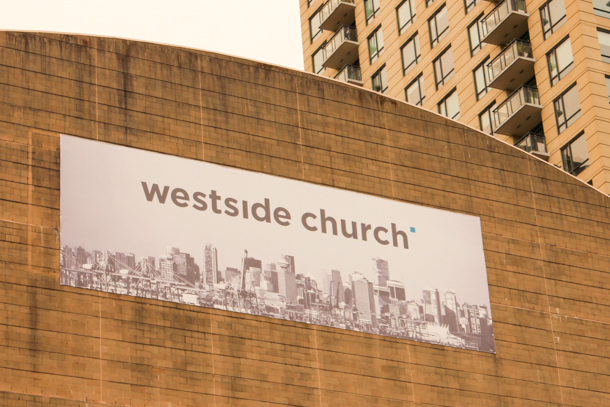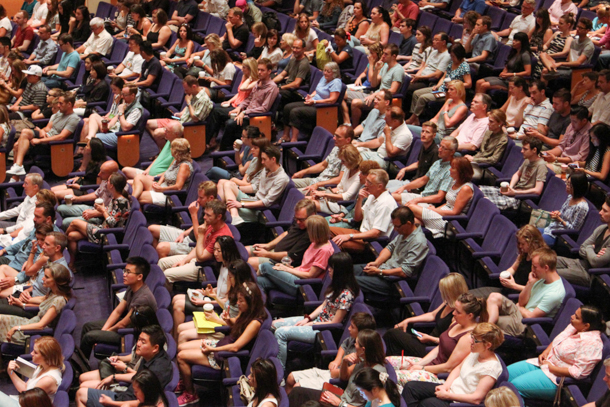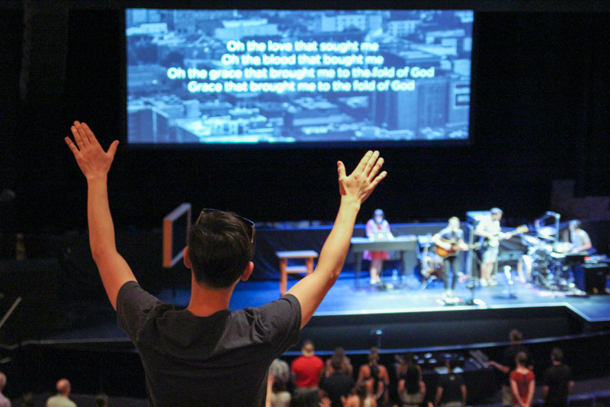If you visit Westside Church on a Sunday morning, prepare to walk a gauntlet of smiles and hellos. Even the guy directing parking is happy to see you. It feels like a family reunion: hugs and handshakes between people of all ages and ethnicities.
The "sanctuary" isn't a typical echoing pew-lined space either. Instead, you make your way up a grand, marbled staircase to reach Vancouver's Centre for the Performing Arts theatre -- the church owns the downtown site.
You take your seat (it's really comfy) with hundreds of others, and the band begins to play. And no choir or organ -- it's Christian rock with drums and electric guitars. There's a sea of raised hands. It feels like everyone in the room is singing: "Here in the love of Christ I stand."
Pastor Norm Funk shows up on stage. Yes, he's wearing jeans. In a booming, amplified voice, Funk welcomes the congregation. "Westside, it is good to see you!"
This isn't your grandparents' (or your Christian friend's grandparents) Sunday worship. As the number of Canadians identifying as Christian -- especially West Coasters -- continues to decline, large, outgoing congregations like Westside's are increasing their attendance. It's the "megachurch" recipe from America, 21st century Protestantism's marketing-savvy countercurrent to what an MBA might call declining interest in its former, more mature brand.
Packaging Christ in a contemporary way has helped Westside, where 1,500 visit to reflect and recharge every Sunday. It's happening at other churches in Metro Vancouver too. About 2,000 attend Tenth Church's five Sunday services across three Vancouver locations. And over 4,000 attend Willingdon Church in Burnaby, considered to be the second-largest Protestant church in Canada.
These larger churches have impressive numbers, but they are stand-out peaks against a backdrop of declining market share for Christianity -- and for religion generally in B.C.'s Lower Mainland.
More than a quarter -- 28 per cent -- of Canadians who responded to the 2011 National Household Survey said that they had no religious affiliation. In Metro Vancouver, the share was 41 per cent -- 13 points higher.
Meanwhile, Christianity's claim on Canadians' faith has dropped from 59 per cent of us across the country who identified with the religion in 1991, past 50 per cent in 2001, to 42 per cent in 2011. (Islam claimed 3.2 per cent, Sikhism and Hinduism 1.5 per cent each, and Jews and Buddhists each account for about one Canadian in a hundred.)
"All of the data suggests that [Christians] are going down," says Joel Thiessen, an associate sociology professor at the Christian liberal arts Ambrose University College in Alberta. Many Anglican, Lutheran and United churches in Canada have closed.
The Pew Research Center calculates the percentage of non-religious in the United States at about 23 per cent. West Coast states are known among religious communities as America's "unchurched belt" for their large share -- an average of 30 per cent -- of faithless.
So, how are places like Westside bucking the trend?
All 'under one roof'
Largely, it seems, by breaking with traditional ways of packaging their message.
Broadway Church has a service with traditional hymns, but also a more electric service at night with smoke machines. Tenth Church invites attendees to join in a communion meal of bread and wine with dietary restrictions in mind: you can take the body of Christ gluten-free. Downtown's Coastal Church hands out wristbands for a summer night service that boasts a party atmosphere with blue lights, music and dancing.

It's all about a range of choice for diverse members, says Broadway Church's director -- whether that's meeting a language need or setting someone up with baseball buddies. There's also more traditional outreach, from food drives to childcare.
Thiessen draws a popular comparison of megachurches to Walmart: "You can find all these things under one roof."
Westside may not quite be a "megachurch" yet. The term is usually applied to congregations of over 2,000, often with elaborate venues. There are about 20 such megachurches in Canada, about 1,200 in the U.S. The world's largest, in Seoul, has a weekend attendance of over 250,000.
Vancouver's Broadway Church, with roots in a group of Pentecostal Christians who came from the prairies 105 years ago, doesn't advertise itself as a megachurch, but probably could. It gets about 2,000 people to Sunday services.
Shelley Clifford has attended Broadway for 35 years. She's the church's director of finance and operations, and says it's still evolving.
"Jesus always spoke to people where they were at," Clifford says. "He told fishermen they would be fishers of men.... He used their language to speak the message. You gotta be current."
Today, Jesus's followers are speaking through rock n' roll, podcasts and phone apps. Broadway's attendance has doubled in the past seven years, Clifford says, "bucking that trend" of declining faith.
Exodus
But most participants say it's community, not the showbiz, that holds these congregations together.
"Fifty families open up their homes," for community meetings in different neighbourhoods, says Pastor Funk of Westside's outreach. "Show me [another] institution that does that. Institutions don't, churches do. Come to my house, we'll break bread together. If you're going through a hard time, we'll cry together. If you need a date, we'll babysit your kids."

Metro Vancouver's most nonreligious demographic is 15 to 34 year olds, at almost 50 per cent. Yet they fill seats at churches like Westside and Broadway. Patricia Wong is 29 and goes to Westside. "Westside moulds into a lot of multiculturalism, lots of diversity, lots of people come together," she says.
The emphasis on diversity is important to the congregation's growth. Thiessen, for one, believes that Christianity would be declining even more rapidly in Canada if it were not for migration. As it is, Metro Vancouver is dotted with churches founded by or for newcomers, and worshipping in Chinese, Korean, Filipino, Vietnamese and Punjabi.
Wong grew up attending such a church with her parents, but found it had less to offer members who spoke English. She says many childhood friends have similarly moved on from their home churches -- either by trying something new or giving up regular Sunday practice despite remaining Christian.
Defying a hateful image
Thiessen puts some of the ferment down to "a part of West Coast culture that's far more laid back and more exploratory, [ready] to try things that are different from the mainstream," adding, "They're far more progressive on all sorts of moral and ethical issues."
That can be a double-edged sword. Many depictions of evangelical Christianity emanating from the U.S. are far from progressive. Westside's Pastor Funk says the faith is painted as hateful, fearful and archaic, while some churches' "unloving, un-Christian" behaviour leads to all churches being "brushed that way."
Broadway's Clifford says her church tries to counter an impression that Christians are "disingenuous" by tackling hard social issues like addiction and depression.

Pastor Jonathan Mitchell takes his message directly to doubting youth by renting different schools across Metro Vancouver once a month for praise and worship evenings that regularly attract 1,000 young congregants from local churches. He hopes the evenings will strengthen the city's smaller congregations. "This is about empowering local [church] leaders to unite and rub shoulders," he says.
That worship style recalls Westside's own beginnings. "We were a bit of a transient, nomadic, set-up-on-a-Sunday, tear-down, put-it-in-the-back-of-a-truck-and-drive-away ministry," Pastor Funk says.
A decade later, Westside has established two spinoff congregations, and Funk is hoping for more. "My greatest joy," he says, "will be when one of our plants plants."
Even if Vancouverites and other Canadians continue to turn away from religion en masse, there are still many keen to keep their faith and pass it on. ![]()

















Tyee Commenting Guidelines
Comments that violate guidelines risk being deleted, and violations may result in a temporary or permanent user ban. Maintain the spirit of good conversation to stay in the discussion.
*Please note The Tyee is not a forum for spreading misinformation about COVID-19, denying its existence or minimizing its risk to public health.
Do:
Do not: